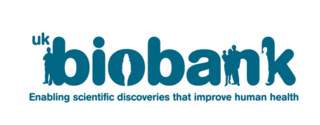Related Research Articles

In academic publishing, a preprint is a version of a scholarly or scientific paper that precedes formal peer review and publication in a peer-reviewed scholarly or scientific journal. The preprint may be available, often as a non-typeset version available free, before or after a paper is published in a journal.

Metagenomics is the study of genetic material recovered directly from environmental or clinical samples by a method called sequencing. The broad field may also be referred to as environmental genomics, ecogenomics, community genomics or microbiomics.

UK Biobank is a large long-term biobank study in the United Kingdom (UK) which is investigating the respective contributions of genetic predisposition and environmental exposure to the development of disease. It began in 2006. UK Biobank has been cited as an important resource for cancer research.

The Wellcome Sanger Institute, previously known as The Sanger Centre and Wellcome Trust Sanger Institute, is a non-profit British genomics and genetics research institute, primarily funded by the Wellcome Trust.

KEGG is a collection of databases dealing with genomes, biological pathways, diseases, drugs, and chemical substances. KEGG is utilized for bioinformatics research and education, including data analysis in genomics, metagenomics, metabolomics and other omics studies, modeling and simulation in systems biology, and translational research in drug development.

The National Survey of Sexual Attitudes and Lifestyles (Natsal) are a series of surveys of people in the Great Britain regarding their sexual behaviour and patterns, and are among the largest scientific studies of sexual behaviours in the world. The rounds of surveys completed to date are Natsal-1 (1990–1991) and Natsal-2 (2000–2001) and Natsal-3 (2010–2012), as well as Natsal-COVID (2020-2021). Data collection for Natsal-4 is taking place from September 2022 to December 2023. Natsal-4's Principal Co-investigators are Pam Sonnenberg and Cath Mercer, both professors at University College, London.

The Wellcome Genome Campus is a scientific research campus built in the grounds of Hinxton Hall, Hinxton in Cambridgeshire, England.

A biobank is a type of biorepository that stores biological samples for use in research. Biobanks have become an important resource in medical research, supporting many types of contemporary research like genomics and personalized medicine.

The 1000 Genomes Project (1KGP), taken place from January 2008 to 2015, was an international research effort to establish the most detailed catalogue of human genetic variation at the time. Scientists planned to sequence the genomes of at least one thousand anonymous healthy participants from a number of different ethnic groups within the following three years, using advancements in newly developed technologies. In 2010, the project finished its pilot phase, which was described in detail in a publication in the journal Nature. In 2012, the sequencing of 1092 genomes was announced in a Nature publication. In 2015, two papers in Nature reported results and the completion of the project and opportunities for future research.
DECIPHER is a web-based resource and database of genomic variation data from analysis of patient DNA. It documents submicroscopic chromosome abnormalities and pathogenic sequence variants, from over 25000 patients and maps them to the human genome using Ensembl or UCSC Genome Browser. In addition it catalogues the clinical characteristics from each patient and maintains a database of microdeletion/duplication syndromes, together with links to relevant scientific reports and support groups.

Earlham Institute is a life science research institute located at the Norwich Research Park (NRP), Norwich, England. EI's research is focused on exploring living systems by applying computational science and biotechnology to answer ambitious biological questions and generate enabling resources. It is situated on the Norwich Research Park, to the west of Norwich on the former A47, and adjacent to the west of the University of East Anglia.

Genomics England is a company set up and owned by the United Kingdom Department of Health and Social Care to run the 100,000 Genomes Project. The project aimed in 2014 to sequence 100,000 genomes from NHS patients with a rare disease and their families, and patients with cancer. An infectious disease strand is being led by Public Health England.
The History of Modern Biomedicine Research Group (HoMBRG) is an academic organisation specialising in recording and publishing the oral history of twentieth and twenty-first century biomedicine. It was established in 1990 as the Wellcome Trust's History of Twentieth Century Medicine Group, and reconstituted in October 2010 as part of the School of History at Queen Mary University of London.
Dynamic consent is an approach to informed consent that enables on-going engagement and communication between individuals and the users and custodians of their data. It is designed to address the many issues that are raised by the use of digital technologies in research and clinical care that enable the wide-scale use, linkage, analysis and integration of diverse datasets and the use of AI and big data analyses. These issues include how to obtain informed consent in a rapidly-changing environment; growing expectations that people should know how their data is being used; increased legal and regulatory requirements for the management of secondary use of data in biobanks and other medical research infrastructure. The approach started to be implemented in 2007 by an Italian group who introduced the ways to have an ongoing process of interaction between researcher and participant where "technology now allows the establishment of dynamic participant–researcher partnerships." The use of digital interfaces in this way was first described as 'Dynamic Consent' in the EnCoRe project. Dynamic Consent therefore describes a personalised, digital interface that enables two-way communication between participants and researchers and is a practical example of how software can be developed to give research participants greater understanding and control over how their data is used. It also enables clinical trial managers, researchers and clinicians to know what type of consent is attached to the use of data they hold and to have an easy way to seek a new consent if the use of the data changes. It is able to support greater accountability and transparency, streamlining consent processes to enable compliance with regulatory requirements.
Machine learning in bioinformatics is the application of machine learning algorithms to bioinformatics, including genomics, proteomics, microarrays, systems biology, evolution, and text mining.

Biological data refers to a compound or information derived from living organisms and their products. A medicinal compound made from living organisms, such as a serum or a vaccine, could be characterized as biological data. Biological data is highly complex when compared with other forms of data. There are many forms of biological data, including text, sequence data, protein structure, genomic data and amino acids, and links among others.

The COVID-19 Genomics UK (COG-UK) consortium was a group of academic institutions and public health agencies in the United Kingdom created in April 2020 to collect, sequence and analyse genomes of SARS-CoV-2 at scale, as part of COVID-19 pandemic response.
The Centre for Genomic Pathogen Surveillance is a computational genomics research institute in Oxfordshire.

The African Centre of Excellence for Genomics of Infectious Diseases (ACEGID), based at Redeemer’s University, Ede, Nigeria, is a consortium of West African academic and medical institutions partnering for research and training.
References
- ↑ "Sharing Data from Large-scale Biological Research Projects: A System of Tripartite Responsibility" (PDF). Wellcome Trust. Retrieved 19 October 2015.
- ↑ Kaye, Jane; Heeney, Catherine; Hawkins, Naomi; de Vries, Jantina; Boddington, Paula (May 2009). "Data sharing in genomics — re-shaping scientific practice". Nature Reviews Genetics. 10 (5): 331–335. doi:10.1038/nrg2573. PMC 2672783 . PMID 19308065.
- ↑ Committee on Metagenomics: Challenges and Functional Applications, Board on Life Sciences, Division on Earth and Life Studies, National Research Council of the National Academies (2007). New science of metagenomics : revealing the secrets of our microbial planet. Washington, DC: National Academies Press. ISBN 978-0309106764.
{{cite book}}: CS1 maint: multiple names: authors list (link) - ↑ Parker, Michael (2013). "The ethics of open access publishing". BMC Medical Ethics. 14 (1): 16. doi: 10.1186/1472-6939-14-16 . PMC 3614527 . PMID 23521857.
- ↑ Kaye, Jane; Gibbons, Susan M.C.; Heeney, Catherine; Parker, Michael; Smart, Andrew (2012). Governing biobanks understanding the interplay between law and practice. Oxford [England]: Hart Pub. p. 297. ISBN 978-1847318831.